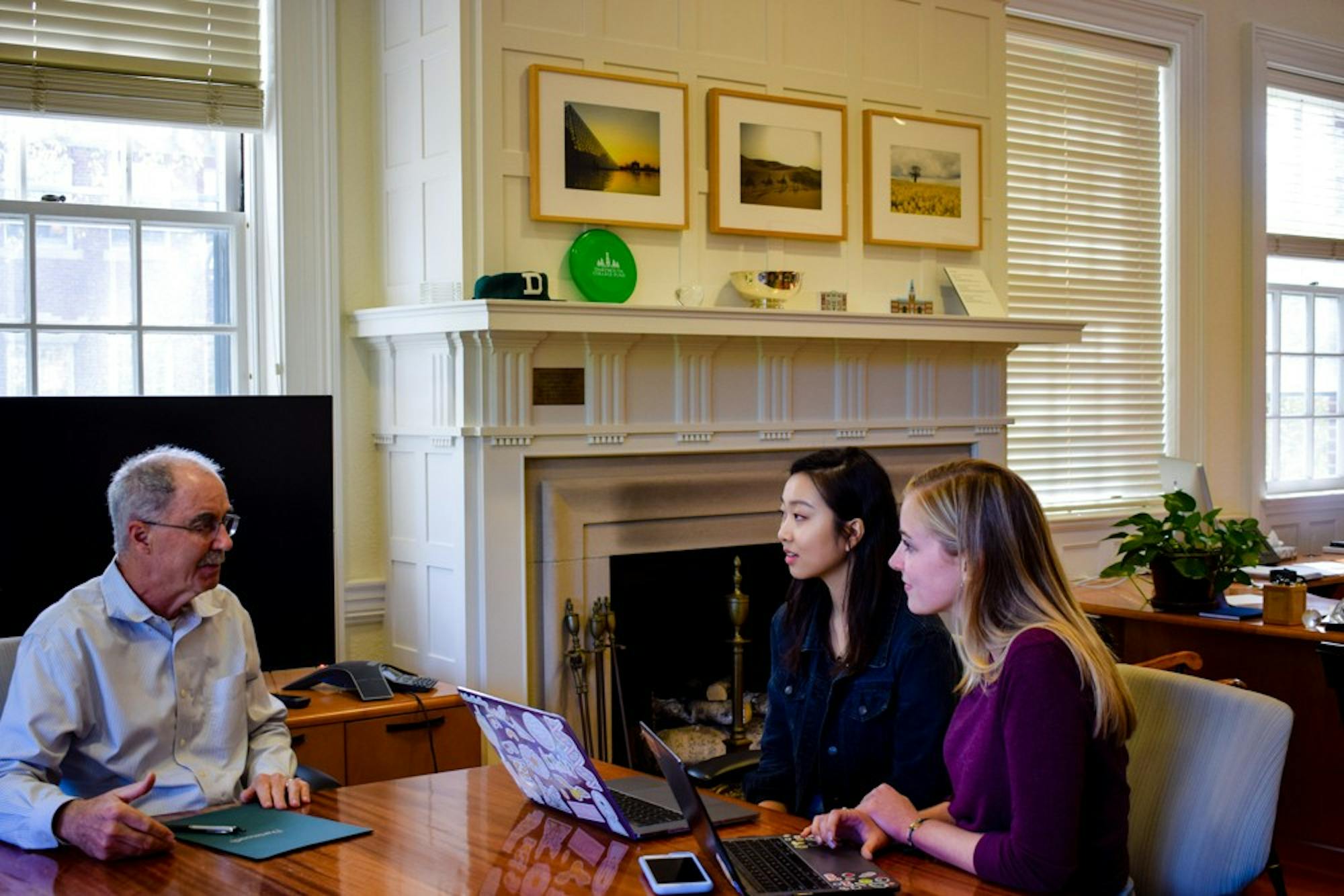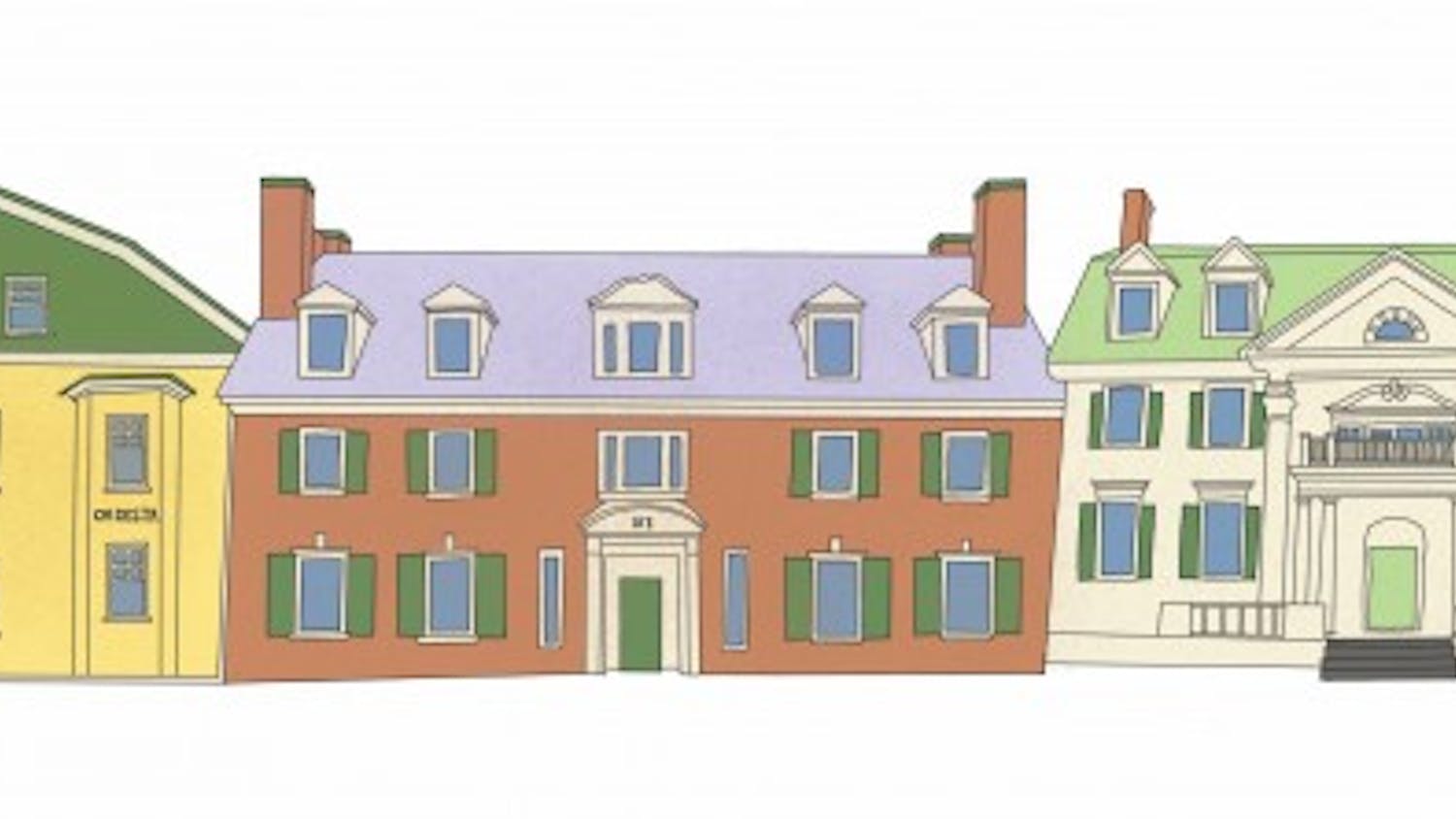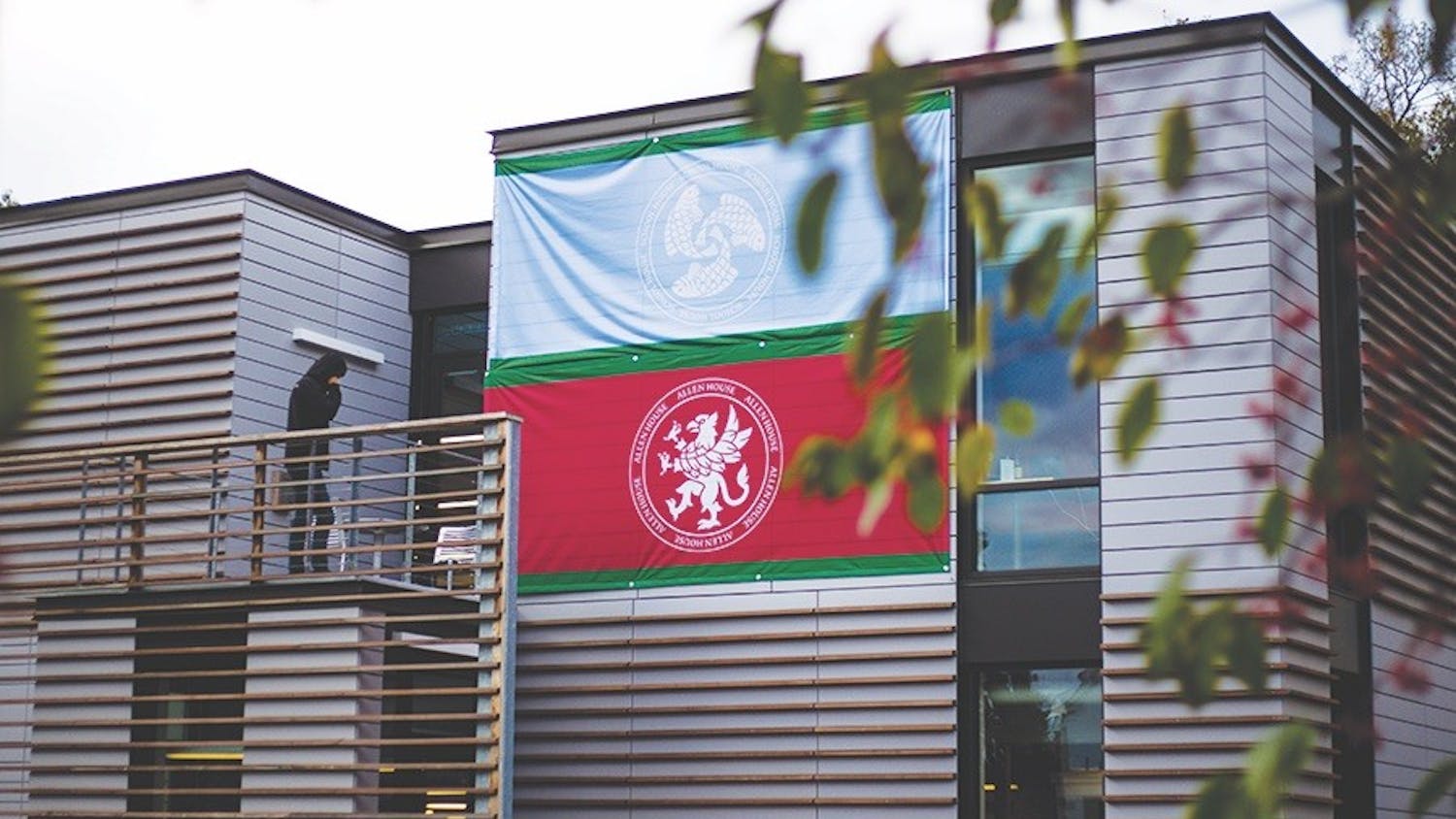This article is featured in the 2019 Homecoming special issue.
College President Phil Hanlon has been president of Dartmouth College since 2013. Hanlon is the 18th president of the College and graduated in 1977 with a Bachelor of Arts degree as a mathematics major. The editors of The Dartmouth Homecoming Special Issue, Maggie Doyle ’22 and Arielle Beak ’22, sat down with President Hanlon to discuss his personal journey at Dartmouth, mental health on campus, the new residential access policy, and his vision for the College as a global research institution.
The theme of this Homecoming issue is Metamorphosis and Migration. We thought this encapsulated students’ experience at Dartmouth and the journey they go through in their four years here. How would you view your own journey of metamorphosis at Dartmouth over both your four years as a student and as the president now?
PH: As a student of course, it was a long time ago. I arrived here fall of ’73 and graduated spring of ’77. I come from a really small town in the Adirondack Mountains, and it was a mining town, so it was a pretty rough-and-tumble place. No movie theater, lots of bars, but no movie theater. The point being, growing up, I developed lots of important values like community, love of the outdoors and a work ethic, but I came in with a very unsophisticated view of the world, and not having been pushed much academically in high school.
Coming to Dartmouth was quite a shock, and fall term I really struggled academically; I was just not well prepared. I got some pretty lousy grades my first term. The story has a happy ending; I ended up Phi Beta Kappa and summa cum laude, so I was fine, but it was a big adjustment. In terms of my journey, one of the things I did was I found my love of the life of the mind.
I came in not having exercised my intellect much and discovered how much I loved learning, what a thrill I got from advancing the frontiers of knowledge. I did a whole bunch of undergraduate research in math. I was a math major, so that was one important part of my metamorphosis: coming in with an underdeveloped appreciation for the life of the mind and leaving totally committed to it.
I think also I came in very much lacking in confidence. I knew right off the bat that my classmates — many of them had been to top prep schools — they knew a lot more about the world and were much better prepared for this experience than I was. I was pretty shook up right at the start, and I think by the time I left and entered a Ph.D. program at CalTech in math, my self-confidence had grown a ton. And then, of course, like all Dartmouth alums it seems, I made my best friends in life while I was at Dartmouth, and they have been steadfast friends all the rest of the way.
How do you think student life has changed from when you were a student until now?
PH: The biggest change in coming back here, for me, was the diversity of the student body. It’s terrific, it’s vibrant, it’s robust, it’s such a different scene than when I was a student. I was in the second class of coeducation. Just so you can get your head around the numbers, at that point a quarter of the entering class in 1972 were women, and then a quarter of my class entering fall of 1973 were women. That’s one-eighth of the students were women when I started, and it was almost entirely white guys. A huge positive change in student life has been the rich diversity of perspectives and backgrounds.
In other ways, there are things about Dartmouth which have not changed since I was a student and which probably have not changed in the whole 250 years, one of those being the tight community here. That was present then, and I sense it’s present now. I’m sure it has something to do with the setting.
We’re not embedded in a big city where people go off campus and do something else. We’re all thrown here together in this breathtaking environment, which can also be challenging at times, like those cold, February mornings.
Also, the fact that there’s less of a divide between the faculty and students here than I’ve seen other places, particularly faculty and undergraduates — I think that tends to make this a more cohesive place.
A current issue that affects many students right now is mental health. How do you imagine Dartmouth expanding its mental health resources access in the coming years?
PH: When I get together with my presidential peers, this issue is top of mind for all of us. There’s nothing more important than safety of students, and mental health is a part of that, and mental health of everyone on campus is an important part of us being a successful institution.
Interestingly, I’m attending three conferences this fall with my peers and others, and they’re all on mental health. I attended one at the Academy of American Arts and Sciences in September. It is an issue of huge importance for all institutions of higher education right now.
I think we are, like most of our peers, approaching this in two ways. One is increased staffing. We’ve committed to growing our staffing so that students who need help can get help, and get it in a timely way. Second, we’re trying to experiment with pilot programs.
One thing that our mental health professionals are working with are some of the people in Geisel who are experts in using mobile apps to supplement human-to-human therapies and care. I think the Tilt Factor Lab has some interesting ideas. Mary Flannagan, a professor here, has a lab called Tilt Factor, which develops games that promote social good. If you play the game, you become more environmentally conscious, or conscious of your internal biases, stuff like that. She’s got some interesting ideas and she’s talking to our professionals about whether games could be used to preemptively develop coping skills. Those are sort of longer-term interesting pilots, but I’d say the immediate thrust is to get more staffing in place.
There was a presentation by a group at the University of Michigan that has one of the largest national studies, and the prevalence we’re experiencing at Dartmouth is right on the national average. It may be more intense because we’re in a more isolated environment, I don’t know, but the prevalence here is not any different than elsewhere.
Interestingly, with the last meeting, there were a set of content experts in mental health. One of the more intriguing comments, which more than one of them said, was that they thought one of the contributors to anxiety within people of your generation is that you feel that people of my generation have abandoned you. We’re not taking care of the environment, we’re running trillion-dollar-a-year deficits in the federal budget. We’re just going to be leaving you a mess. It’s a little hard to argue with.
In light of the recent residential access policy, how do you reconcile the desire to promote house affiliation with the desire for Dartmouth to be open and inclusive to all students?
PH: You’re right; both of those are really important objectives, and I get that sometimes they’re in tension. Good things you want to achieve often are in conflict, and you have to use judgment and hopefully come up with innovative, creative ideas to try to get as much of both of them as you want.
There was an interesting address to Harvard Law graduates by Justice David Souter, who said that in the cases the Supreme Court hears, it’s very rare it’s something good versus something bad. It’s almost always something good versus something good.
The actual decisions about dorm access don’t come to my level. I have heard about the issues and student concerns about them. What I did do was make sure the Dean of the College and the Residential Life folks were working with the Student Assembly and other students to resolve it. My understanding is there’s some sort of group meeting and discussing, and hopefully they can come up with something that gets 90 percent of both of those.
How do you envision the Housing System and Greek Life coexisting on campus? How can these two entities work symbiotically in the same space?
PH: I don’t actually view them as being in conflict. I view them as complementing and supplementing each other. It’s probably worth discussing the origins of the housing communities system.
When I arrived in June 2013, the first summer Gail and I had a million meetings with students all day every day, getting groups together to ask them about what was going on on campus and what life was like. What we heard at virtually every one of those meetings was great dissatisfaction with housing, and that when you had an off-term, you got moved to some other place where you didn’t know anyone.
I knew the bed counts were too tight to ensure that you could return to exactly the same building after an off-term, but we realized we had enough flexibility that at least by groups of buildings you could come back.
The goal of that was to fix the problem of there being very little community within your residence life. The idea was to try to boost your residence hall, and in this case, small group of residence halls, as yet another source of community on campus.
Once we decided we wanted to address continuity of housing, it was an obvious step to say, “Let’s actually get some faculty involved, so that we can use this to increase contact between faculty and students. Let’s try to have academic programming, let’s try to have social events, and let’s make sure this is governed in a way that’s gender neutral and diverse among every perspective.” That’s how the House community system was born.
We’re learning every year, and hopefully we’re going to do it better every year. The students who I’ve met who are leaders within the House communities and the faculty involved are awesome; I think they’re some of our best. It’s the people that make anything happen, so I’m confident we’re going to pick up more and more momentum.
I don’t view it as a competitor to the Greek system. What we heard that first summer was that some number of students said they felt like they had to join a Greek house to have some sort of a stable community. Hopefully, with the
house system, students who aren’t really interested in the Greek system won’t feel like they have to join.
One of the things I think is really powerful about Dartmouth is a longstanding tradition, certainly predating me, that students organize their own social scene. I think it’s a really powerful part of the Dartmouth experience. It obviously comes with responsibilities and sometimes, unfortunately, organizations don’t live up to those responsibilities, but overall I think it adds a lot to what the Dartmouth experience is.
If you were a student right now, how do you think you would balance your experience being a part of the new house system with being affiliated with a Greek house, as you were with Alpha Delta?
PH: I don’t know that that would be a conflict. It would be two sets of opportunities for social interaction, and I think the House communities would also bring more opportunities for interactions with faculty and guest artists, if that’s what interested me — and I was pretty nerdy, so it probably would have interested me.
There’s been a recent shift in focus, especially with the global summit, on Dartmouth’s global presence. Why does it matter that Dartmouth is an international institution?
PH: Great question, because it does matter a lot to me. With the global summits in particular, we have put a stake in the ground and said that we want to raise our profile outside of the United States. We want to be more visible, better known, we want to recruit talent more effectively from across the world, and we want to be on the ground, addressing some of the urgent issues in different parts of the world.
I think that’s important in particular because we want to recruit the best talent to our campus, and as you know, talent doesn’t just reside here in the United States. Human talent is all over the world, so we want to make sure we can effectively recruit students, faculty and staff from all over the world.
Second, we want to be on the ground because you will be entering a highly global world and global economy with much more mobility. You’ll be doing work and experiencing all parts of the globe. It’s part of our job to help you get ready to be effective leaders once you leave here. Having an international experience is really important for that.
It’s also the case that some of the most urgent world issues express themselves differently in different parts of the world. Pollution is a good example. Within the U.S., we have some issues, but if you were to ask, “Where do you go for the most urgent pollution-related issues?” it’s probably places in Asia. If that’s something we want to work on, we need to be able to be there and be on the ground.
Another growth area at Dartmouth is the graduate program and research; for example, the establishment of the new Irving Institute. How do you imagine these more university-like roles interacting with Dartmouth’s identity as an undergraduate college?
PH: The first and most important thing to say is that I’m expecting the Irving Institute to be full of undergraduates. I want them to be there, I want them to be doing research work, I want them to be doing policy work. Anything we do at Dartmouth, undergraduates should be deeply involved in. The Irving Institute, the Cancer Center and the Magnuson Center, they are examples — whenever you hear the word “center” or “institute,” what it refers to is a horizontal integration on campus. Different disciplines, like math, history, English or physics — those disciplines go deep in terms of knowledge and intellect.
What the institutes do, is they pull talent from across these disciplines and support people working across disciplines. They convene faculty and students from different majors, and that’s not easy to do. If you’re a faculty in environmental studies, you may not even know who works on batteries in the engineering school, or something like that. What the institutes do is help integrate all of our assets and aim them at a particular issue, whether its cancer or meeting the energy demands of the future in a way that sustains the planet. I don’t view any of these centers or institutes as being the domain of research and graduate students. I want undergraduates totally involved.
That wraps up all of our questions. Do you have anything to add or anything you want the community to know going into Homecoming?
PH: Just that I have never been more excited about the future of this institution — it’s a place that completely changed my life, and to be able to get back to see it flourish and blossom as it is right now is really a thrill for me. I want to say that, and don’t touch the bonfire.
This interview has been edited for clarity.




